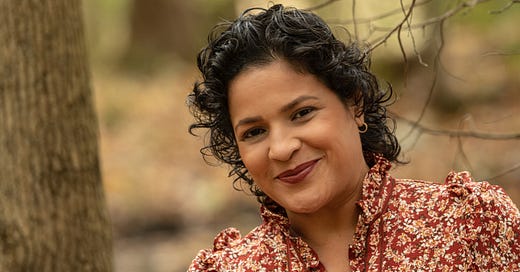Intimate conversations with our greatest heart-centered minds.
Vanessa Mártir and I first bonded over dogs. I was walking my neighbor’s dog, the irrepressible Ortiz, and doing so was helping me heal from head and brain injury; Vanessa was walking her family dog, Napoleon, a practice she’d formed when grieving the death of her beloved brother many years before. We both loved venturing as deep into nature as possible: the sturdily rooted trees, the joyful birdsong, the earnest flowers. They renewed our belief in ourselves and the world.
Later, we met at the legendary 2019 AWP panel: Writing The Mother Wound which Vanessa moderated. Prior to Vanessa, I wasn’t familiar with the Mother Wound but her work on this topic reshaped how I understood my relationship with my own mother as well as mother/child relationships in general. So many of us are unmothered. Or inadequately mothered. Often raised by mothers who were unmothered themselves. But true to Vanessa’s big heart, no matter how dire the circumstances, there is always hope and healing.
Raised in Bushwick, Brooklyn, Vanessa is a graduate of Columbia University. She’s the creator of Writing Our Lives which offers lively, thoughtful, and to-the-bone writing workshops that revolve around topics such as the seasons, writer’s block, and grief. Her work has appeared in The New York Times, The Washington Post, and The Guardian, amongst others. I wanted to speak with Vanessa because she radiates kindness and truth—and is also a badass.
We chatted about lineage stories, gardening, and being true to your heart.
I first became aware of your work when you were on the 2019 AWP panel on Writing the Mother Wound. I thought we could start there. Could you talk about the Mother Wound? What it means to you? How you came to write about it?
I have to take you back to 2013 when my brother passed away, it was a huge loss for me, he was my Superman. In my mother's grief, she turned her back on me. She and I have always had a difficult relationship. She's been in and out of my life for years. I left home to attend boarding school at thirteen and never moved back. When Carlos died, and she turned her back on me, it amplified the grief. There’s an essay by Cheryl Strayed called Heroin/e where she writes about how when someone dies, they tell you about the grief of the loss but they don't tell you about the griefs that loss will uncover. What came shooting at me–there's no way else to describe it, it was like a bullet to the heart–was my relationship with my mother. There was no running away from it anymore. And because I am who I am, I threw myself into literature about strained mother daughter relationships, and found work on the mother wound.
The work I found was very white cis heteronormative. As a woman of color, I questioned where does race fit in this? Where do different ethnicities, different cultures, the horrors of immigration fit into this? I started researching, and I found answers in literature. That’s where I found the term unmothered. I have felt unmothered for much of my life. I found the work of Jaquira Díaz, and I found that a ton of Toni Morrison's work is mother wound work. I started collecting and documenting what I learned because I'm obsessive, I'm a nerd, and I love research. I'm also a writer, and I love to read. That led to the Writing the Mother Wound class, which led to the Writing the Mother Wound panel.
Can you define what you see as the mother wound?
The mother wound is very gendered. That’s part of what I've discovered in the research, and I'm trying to pick that apart. It’s the relationship between mothers and daughters when it’s made difficult by the mother's traumas. Usually, mother's traumas are a result of patriarchy. The thing is, that doesn't delve into or examine how the mother wound is shaped and exacerbated by realities like racism, the legacies of colonization and slavery, the dissolution of the family as a result of racism and slavery.





